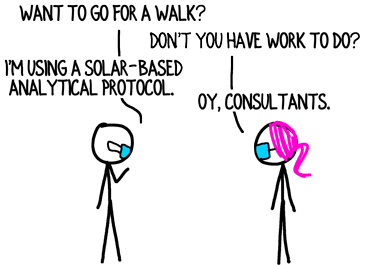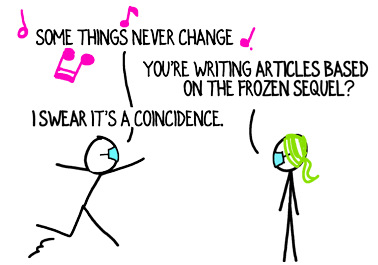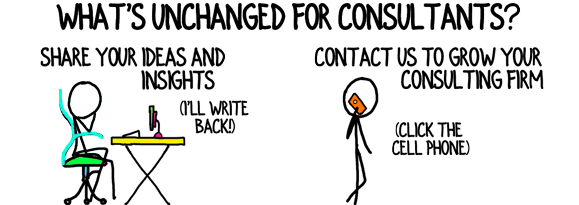Don’t Panic, Don’t Change. 5 Constants Your Consulting Firm Can Rely On
What world greeted you this morning? Birds chirping? Blossoms fluttering?
Here in New England the sun’s been shining. Not just shining; it’s ushered in a breathtaking, clients?-what-clients?-go-for-a-walk kind of day.

Hold on. What’s up with all the sun-drenched cheeriness and good will? Doesn’t the universe know that millions of people are suffering, and practically the entire human species’ daily routine is disrupted? Everything has changed!
Except, it hasn’t.
The weather’s still glorious. Kids continue to run, tumble and laugh. Melted chocolate is still the best choice for topping sundaes.
Even consulting, while undeniably affected by the global crisis, remains fundamentally unaltered in many ways.
What do you think continues to hold steady in consulting? Below are a handful of thought-starters.
5 Constants Your Consulting Firm Can Rely On
Businesses Are Still Awarding Consulting Projects
There’s no doubt that large swaths of the economy are in shambles and some industries have been decimated. Yet, clients need help and will pay for outside expertise.
Collectively, the small consulting firms I work with have won over $2 million in new revenue since the pandemic started in the U.S.
There’s business available for you too.
Action: Listen to the market and stay Right-Side Up.
Successful consulting has always been about what clients want to buy, not what your consulting firm wants to sell. Focus intently on what your targets want right now and you will find projects.
Projects Are Still Awarded Based on Trust and Value
Which consulting firms are winning engagements in an increasingly competitive consulting environment?
As always, clients select the consulting firm they trust most to deliver an outstanding solution to an urgent need.
Action: Double down on your relationship-building, amp up your thought leadership and don’t run a fire sale on your firm’s consulting services.
You bolster trust and credibility by nurturing relationships and demonstrating your prowess, not by cutting prices.

Consulting is Still About Managing Risk
Consulting is, fundamentally, a risk-transfer exercise. Your client pays your consulting firm a fee to reduce risk of damage from a problem or to enhance the likelihood of achieving an aspiration.
When you fully understand the risks gnawing at your prospects, you can develop a tailor-made, alluring proposal.
Right now, your prospects are wrestling with uncertainty, and they perceive peril at every turn.
Action: Ask your consulting prospects what their risks and concerns are.
Create new playbooks for trading risk. For example, offering generous payment terms eases your consulting prospect’s cashflow fears.
Prove you’re considering the new threats worrying your consulting prospects. How, for instance, are you ensuring you can communicate with scattered stakeholders?
You Can Still Deliver Value Without Being In-Person
For consulting firms that have relied primarily on in-person, on-site delivery, creating value remotely is a revelation. (Okay, Boomer.)
You’ll always derive value from meeting other people eyeball-to-eyeball, and it’s tougher to judge a manufacturing workflow from thousands of miles away.
Nevertheless, clients and consulting firms are waking up to a truth as old as the Roman empire: as long as you can communicate with your clients, you can solve most of their problems from the comfort of your bathtub.
Action: Set your consulting firm’s sights on a permanent shift to remote, value delivery. (You’ll still want to return to in-person interaction for relationship-building, of course.)
Invest in processes and technology that enable you to wow your clients while restricting your team’s work commute to three minutes.

Consulting Still Works Best as a Team Sport
Collaboration with colleagues and clients improves your consulting firm’s deliverables and increases the odds you’ll win follow-on work.
Nothing in todays’ crazy world has altered that truth a single iota.
Action: Overcommunicate with your partners, prospects, and clients. Organize teams, lead groups, and orchestrate virtual gatherings.
Despite physical isolation, you can encourage everyone in your orbit to join in and, as a result, generate better outcomes.
What else has remained unchanged for consulting firms? Remind me (and other readers) what else we can rely on.
Text and images are © 2024 David A. Fields, all rights reserved.

 David A. Fields Consulting Group
David A. Fields Consulting Group 

Excellent article as always, David.
A phrase I’m hearing a fair amount of these days is, “priorities have shifted.” I’m trying to remember to always ask, “what are the new priorities?”
John, that’s an excellent reminder on multiple levels. First, that a “No” from a prospect is a signal to engage in conversation; second, that the market always has needs, and our job is to find them and adjust appropriately.
Terrific addition to the post, John.
John – your comment is so important that I have screen-shot it and will post it on my company website. We are so guilty of failing to use a “no” or “not now” as an opportunity to better understand our customer and give ourselves a chance to continue to deliver value to them.
Great article, David. I see a lot of price slashing and I thought the other day, “Why are you assuming that your clients who need you also need a discount?” I believe that the relationships ARE key and finding out what their situation is and the impact has been before you start an across-the-board fire sale. Of all of my clients, I’ve only had to adjust payment schedules of two. The rest are doing great. One was transportation-oriented, and that industry has totally shut down bc of mass transit, and the other was based on commercial real estate. Another hard hit industry. They will both bounce back.
Thank you for providing the case studies, Terry, and for eloquently reinforcing that our first response to a hiccough in demand shouldn’t be to lower fees.
Thank you- appreciate the perspective.
And thank you, Kathie, for reading and engaging!
I love the masks! Very creative and contemporary!
We had a big masks/no-masks debate here at the firm’s headquarters. Most of the stick figures insisted on masks–they just don’t know who’s scrolling down the page and breathing on them.
It’s great to hear from you, Dan.
I really like the combination of the these 2 discussions. Customer — priorities have changed, we can’t afford the cost. Consultant – What are the new priorities? What help do you need? Then restructure the discussion, don’t discount, get laser focused on how to meet the new priority in the most efficient and effective way. This may mean a lower cost to the client but gives them answers to what they need.
You’re right on the mark, Chuck. Clients are emerging from pure panic, hair-on-fire mode and now they need help. Yes, they’re concerned about cash flow. Got it. That’s one concern that can be addressed in a high-value consulting engagement.
Noting that two-part message from clients was smart, Chuck. Thank you for posting it here.